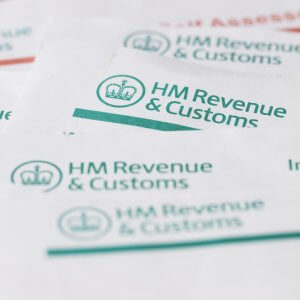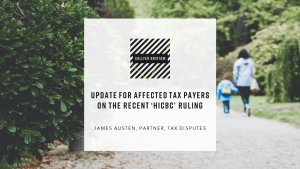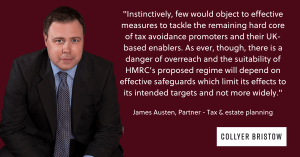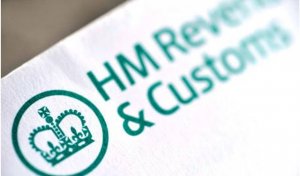- Tax disputes & investigations

Longer Reads
Supreme Court rules against HMRC in family business case
Partner James Austen comments on the Supreme Court’s decision in the Fisher Transfer of Assets abroad appeal.
2 minute read
Published 22 November 2023
Key information
- Specialisms
- Private Wealth
- Services
- Tax disputes & investigations
The Supreme Court has today (Tuesday 21 November 2023) handed down its decision in the Fisher case on the scope of the UK’s “Transfer of Assets Abroad” (“TOAA”) tax code, finding unanimously for the taxpayers on every point. As Lady Rose’s judgment notes at the outset, the TOAA rules are some of the most fiendishly complex in UK tax law, which, given the typical complexity of UK taxation, is a remarkable (if dubious) achievement. It is perhaps not surprising, then, that the outcome of the appeals in this case has been different at every stage. Remarkably, it has taken more than a decade for the Fisher case to be finally determined by the Supreme Court: it was first heard in the First-tier Tribunal (Tax Chamber) in early 2013 – although the Upper Tribunal’s reference to the Court of Justice of the European Union did take several years.
Lady Rose, who gave the only reasoned decision, with which the other members of the Court agreed, was previously President of the Upper Tribunal (Tax and Chancery Chamber), and the only Supreme Court Justice with notable tax experience. So it was appropriate that Lord Reed, the President of the Supreme Court, invited her to give the leading decision.
What Lady Rose calls the “paradigm case” within the TOAA regime is “where an individual resident in the United Kingdom transfers assets… to a person overseas so that instead of that individual receiving and paying tax on income arising… the [transferee] either retains the income or transfers it to the individual in the form of capital.” The intended effect of the TOAA rules is to tax the individual on the income arising to the non-UK transferee whether or not he or she receives it. Perhaps surprisingly, the rules date back to 1936, though they have become increasingly relevant as international travel (and tax planning) has become more widespread. One of the main difficulties with the TOAA regime as it has been operated by HMRC in recent years is that the “paradigm case” nowhere near exhausts the circumstances in which the rules are applied against taxpayers.
The Supreme Court’s judgment was on two very narrow points: first, whether an individual (or his/her spouse) had to be the “transferor” of assets overseas with the intention of avoiding UK tax; and secondly, whether shareholders in a company could be treated as “transferors” where the company made the actual transfer. The Court decided the first question in the affirmative, and the second in the negative. For now, the overall effect is confirm that the scope of the TOAA code is significantly narrower than HMRC has believed, and it will hopefully provide much-needed clarity to taxpayers and their advisers in future, and materially limit the application of the TOAA rules to similar cases in future. Though with the Chancellor’s Autumn Statement taking place tomorrow (Wednesday 22 November 2023) and the draft Finance Bill 2024 legislation being published in parallel, it is possible that the Government might immediately seek to change the law to reverse the Supreme Court’s decision.
Lady Rose has confirmed that a shareholder in a company – even a majority shareholder – will not be a “transferor” in relation to a transfer by the company, even if they are also the company directors who decide to make the transfer. This is a welcome and much-needed clarification insofar as it goes, and it goes further than many tax commentators had predicted. However, uncertainty as to the ‘outer limits’ of who will be a ‘quasi-transferor’ remain: Lady Rose said that a decision on that will have to await a future case to which it is relevant.
In what might turn out to be an important departure from the more typical recent judicial trend of construing tax provisions strictly against taxpayers to prevent avoidance, Lady Rose commented that the TOAA rules have both ‘perplexed’ and ‘concerned’ judges because they can be so punitive in operation, potentially subjecting innocent individuals to tax on amounts from which they may never benefit. Lady Rose was critical of HMRC’s general approach to the TOAA code: their KC’s argument that taxpayers’ uncertainty about whether or not the rules applied to them was positive, as it would dis-incentivise avoidance, received especially short shrift. And whilst Parliament is sovereign, so can do practically anything it likes in legislation, the more punitive a law, the less likely the Courts and Tribunals are to construe it against taxpayers. Whilst not expressed in such terms, this approach is the result of the ancient principles that taxation requires certainty and that punitive measures must be especially certain. This case was not about the so-called ‘Ramsay’ anti-avoidance approach to construing tax laws, which has been so important in defeating what judges consider to be ‘unacceptable’ tax avoidance over the past 40 years, but the tenor of the Supreme Court’s judgment today leads one to wonder whether a high-water mark in judicial approaches to tax avoidance has been reached.
This article was first published on 22 November 2023 by eprivateclient.
For more information, please visit our Tax disputes lawyers page.
Related content
Longer Reads
Supreme Court rules against HMRC in family business case
Partner James Austen comments on the Supreme Court’s decision in the Fisher Transfer of Assets abroad appeal.
Published 22 November 2023
Associated sectors / services
Authors
The Supreme Court has today (Tuesday 21 November 2023) handed down its decision in the Fisher case on the scope of the UK’s “Transfer of Assets Abroad” (“TOAA”) tax code, finding unanimously for the taxpayers on every point. As Lady Rose’s judgment notes at the outset, the TOAA rules are some of the most fiendishly complex in UK tax law, which, given the typical complexity of UK taxation, is a remarkable (if dubious) achievement. It is perhaps not surprising, then, that the outcome of the appeals in this case has been different at every stage. Remarkably, it has taken more than a decade for the Fisher case to be finally determined by the Supreme Court: it was first heard in the First-tier Tribunal (Tax Chamber) in early 2013 – although the Upper Tribunal’s reference to the Court of Justice of the European Union did take several years.
Lady Rose, who gave the only reasoned decision, with which the other members of the Court agreed, was previously President of the Upper Tribunal (Tax and Chancery Chamber), and the only Supreme Court Justice with notable tax experience. So it was appropriate that Lord Reed, the President of the Supreme Court, invited her to give the leading decision.
What Lady Rose calls the “paradigm case” within the TOAA regime is “where an individual resident in the United Kingdom transfers assets… to a person overseas so that instead of that individual receiving and paying tax on income arising… the [transferee] either retains the income or transfers it to the individual in the form of capital.” The intended effect of the TOAA rules is to tax the individual on the income arising to the non-UK transferee whether or not he or she receives it. Perhaps surprisingly, the rules date back to 1936, though they have become increasingly relevant as international travel (and tax planning) has become more widespread. One of the main difficulties with the TOAA regime as it has been operated by HMRC in recent years is that the “paradigm case” nowhere near exhausts the circumstances in which the rules are applied against taxpayers.
The Supreme Court’s judgment was on two very narrow points: first, whether an individual (or his/her spouse) had to be the “transferor” of assets overseas with the intention of avoiding UK tax; and secondly, whether shareholders in a company could be treated as “transferors” where the company made the actual transfer. The Court decided the first question in the affirmative, and the second in the negative. For now, the overall effect is confirm that the scope of the TOAA code is significantly narrower than HMRC has believed, and it will hopefully provide much-needed clarity to taxpayers and their advisers in future, and materially limit the application of the TOAA rules to similar cases in future. Though with the Chancellor’s Autumn Statement taking place tomorrow (Wednesday 22 November 2023) and the draft Finance Bill 2024 legislation being published in parallel, it is possible that the Government might immediately seek to change the law to reverse the Supreme Court’s decision.
Lady Rose has confirmed that a shareholder in a company – even a majority shareholder – will not be a “transferor” in relation to a transfer by the company, even if they are also the company directors who decide to make the transfer. This is a welcome and much-needed clarification insofar as it goes, and it goes further than many tax commentators had predicted. However, uncertainty as to the ‘outer limits’ of who will be a ‘quasi-transferor’ remain: Lady Rose said that a decision on that will have to await a future case to which it is relevant.
In what might turn out to be an important departure from the more typical recent judicial trend of construing tax provisions strictly against taxpayers to prevent avoidance, Lady Rose commented that the TOAA rules have both ‘perplexed’ and ‘concerned’ judges because they can be so punitive in operation, potentially subjecting innocent individuals to tax on amounts from which they may never benefit. Lady Rose was critical of HMRC’s general approach to the TOAA code: their KC’s argument that taxpayers’ uncertainty about whether or not the rules applied to them was positive, as it would dis-incentivise avoidance, received especially short shrift. And whilst Parliament is sovereign, so can do practically anything it likes in legislation, the more punitive a law, the less likely the Courts and Tribunals are to construe it against taxpayers. Whilst not expressed in such terms, this approach is the result of the ancient principles that taxation requires certainty and that punitive measures must be especially certain. This case was not about the so-called ‘Ramsay’ anti-avoidance approach to construing tax laws, which has been so important in defeating what judges consider to be ‘unacceptable’ tax avoidance over the past 40 years, but the tenor of the Supreme Court’s judgment today leads one to wonder whether a high-water mark in judicial approaches to tax avoidance has been reached.
This article was first published on 22 November 2023 by eprivateclient.
For more information, please visit our Tax disputes lawyers page.
Associated sectors / services
- Tax disputes & investigations
Authors
Need some more information? Make an enquiry below.
Subscribe
Please add your details and your areas of interest below
Article contributor
James
AustenPartner
Specialising in UK trusts, tax & estate planning, Private wealth, Tax disputes & investigations and Trusts & Inheritance disputes
Enjoy reading our articles? why not subscribe to notifications so you’ll never miss one?
Subscribe to our articlesMessage us on WhatsApp (calling not available)
Please note that Collyer Bristow provides this service during office hours for general information and enquiries only and that no legal or other professional advice will be provided over the WhatsApp platform. Please also note that if you choose to use this platform your personal data is likely to be processed outside the UK and EEA, including in the US. Appropriate legal or other professional opinion should be taken before taking or omitting to take any action in respect of any specific problem. Collyer Bristow LLP accepts no liability for any loss or damage which may arise from reliance on information provided. All information will be deleted immediately upon completion of a conversation.
Close









































